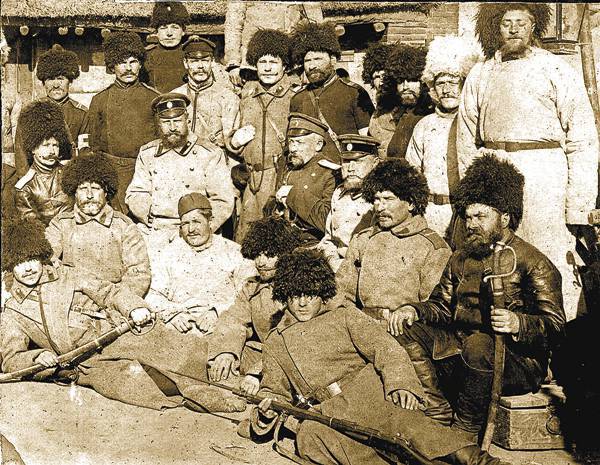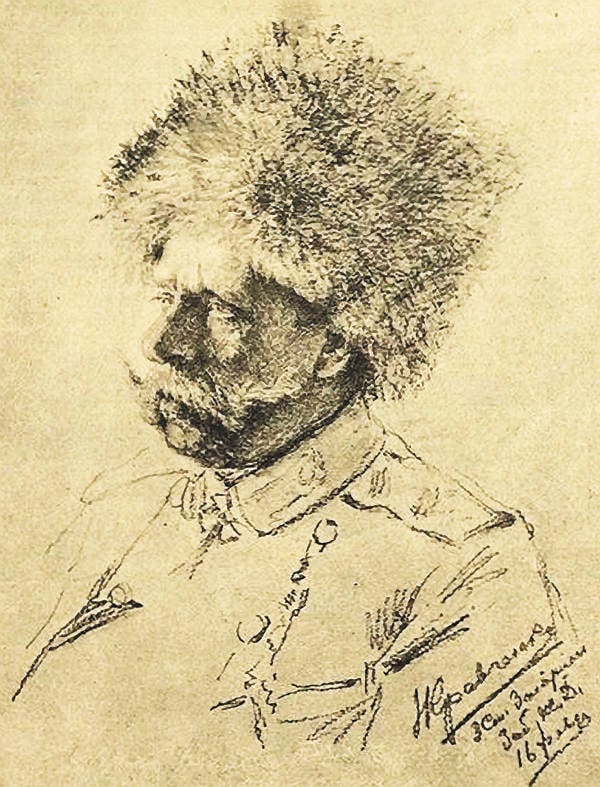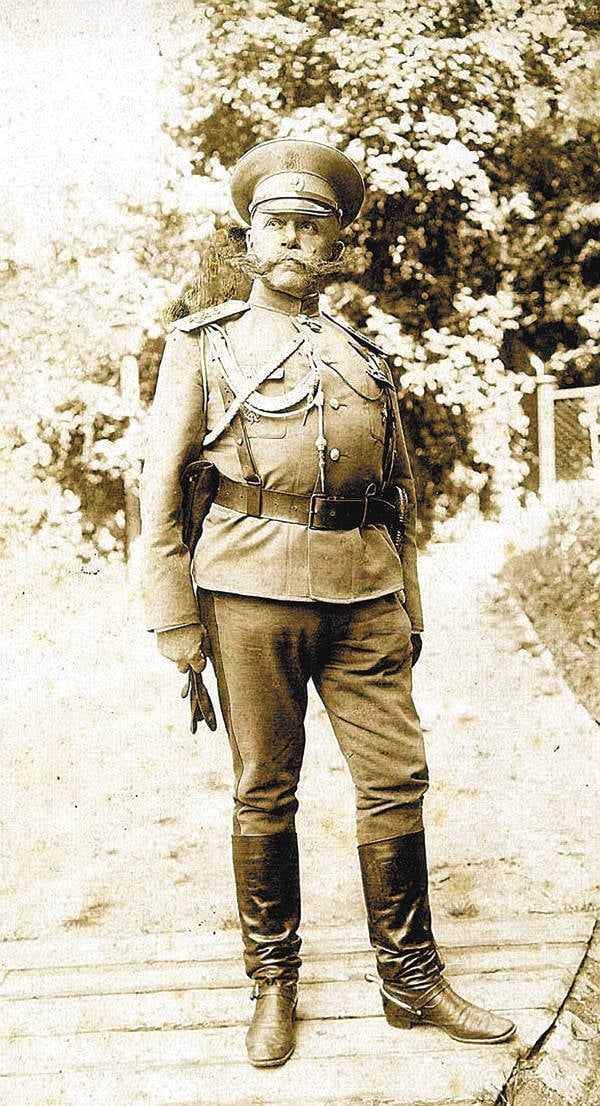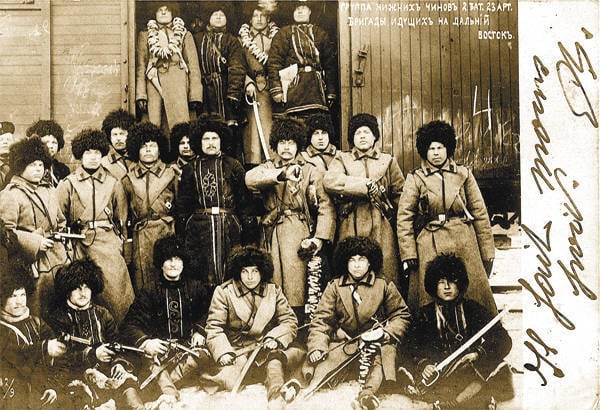Special Forces of Tsarist Russia

SCOUT WRANGEL
General Rennenkampf during each battle was in front, within the reach of Japanese rifle fire. Having spread his legs wide, having straightened his powerful chest, Pavel Karlovich was watching the battlefield with his binoculars, as if he didn’t notice the bullets buzzing and clicking around, giving orders in a sharp, abrupt voice.
The general visited the sanitary trains several times a day, went around the carriages, talking with wounded officers and soldiers, and immediately distributed awards to many. He was going to go to the south, to the forefront, to personally lead the fighting (Grand Duke Boris and his headquarters were serving with him). The wounded on crutches, in bandages, barely hobbling, followed the general and asked him to beat the enemy ... It tore the soul!

In the meantime, friends met in Liaoyan: Cornix Count Benkendorf and the future Black Baron Peter Wrangel, who volunteered for the 2 of the Verkhneudinsky regiment of the Transbaikalian Cossack Army.
Sent to reconnaissance with one Cossack, Count Benkendorf passed through the Japanese guard posts and penetrated into the city of Fynhuangchen, deep in the rear of the enemy. Surrounded on all sides by the Japanese, moving at night and hiding in the wooded hills by day, the Russian reconnaissance officer shot down numerous crocs (plans) of enemy positions.
Returning safely, Count Benkendorf came to Liaoyang to report to the command about the search results. He was already considered dead.
It was also here that Wrangel learned that the Japanese had captured the portage of Miller, who, however, had time to transmit, through the Chinese, a report to ours with the plans he had shot. The orderly Rennenkampf, the centurion Kozlovsky, who voluntarily left a profitable service and asked for reconnaissance, died.
After fighting for three months in the mountains, officers and Cossacks wore to the last degree. The Russian uniforms in the intelligence services were not available, the detachment, in a legal and “not very” way, was extracting clothes from local residents, turning into white Chinese in front of their eyes. The Cossack in a Chinese hat, a silk shirt and blue Chinese sharovars did not surprise anyone.
... Safely hiding on a mountain ridge not far from the ridge occupied by the Japanese, Peter Nikolayevich sketched the location of the enemy trenches and observation post, and his Cossacks destroyed the Japanese head patrol from the ambush. Removing from the dead weapon, ammunition and metal tags with part numbers, the Russians moved away, taking with them two wounded in a shootout.
For this long-lasting and highly productive reconnaissance, the cornet Wrangel was awarded the Order of Saint Anna of the IV degree - the first officer's award. The fourth degree was a red silk lanyard on a piece, on a military slang - “cranberries”, and on the handle of a weapon, an engraving “For Bravery” was made.

Returning from the search, Petr Nikolayevich found out that the Rennenkampf detachment suffered heavy losses near the village of Fandziapudzu. The adjutants and orderlies were all killed or wounded. Pavel Karlovich was sitting on a stone, in some 600 steps from the Japanese, surrounded by the surviving staff, and the bullets lay around.
“I am wounded in the left leg,” the general said suddenly, “I’ll see if the bone is broken.” With these words, he lay on his back and tried to lift his injured leg. Lying on his back, the general took out his watch: it was ten minutes to one.
Rennenkampf tried to crawl, but could not. Then the chief of staff and the trumpeter ran up and, despite the requests of the general, who did not want to endanger them, because the Japanese did not stop the shots, raised the wounded man and began to carry him out of the fire. But the doctor Salichev stopped them and immediately, under fire, bandaged the wound. After a while Pavel Karlovich sighed and said:
- I was not wounded at the right time because interesting things are coming.
After injuring General 2, the Zabaikalye Division was received by the commander of the 2 Brigade, Major General Lyubavin, an elderly, experienced military leader, a brave and cool-headed man. More than once during the Japanese shelling, he drove around on horseback and encouraged his subordinates.
HOSPITAL CROPS
The victories of the Japanese are most often achieved through huge sacrifices. In the battle of Liaoyan, the Japanese lost more than 24 thousand soldiers and officers, while the Russians lost 18 thousand. The Russian victory in this battle was already close. The Japanese were afraid that the Russians would go on the counteroffensive and surround them. But at the most decisive moment, Commander General Kuropatkin gave the order to withdraw. British war correspondents wrote from Japanese trenches: “When the Russians retreated, everyone was glad to get rid of them” ...
In mid-September 1904, the Russian army launched an offensive with the aim of smashing the Japanese between the Shahe and Taijihe rivers, cutting off their supply lines in the east and south. The number of Russian army reached 181.400 bayonets, 12-14 thousands of sabers and 600 guns, it occupied the front in 50 versts from Impana to Phujian, consisting of two groups: Western General Bilderling, Eastern Major General Shtakelberg and reserve - two General Banner.
The detachment of General Rennenkampf covered the left flank of the army, the detachment of General Kossagovsky - right. Japanese forces numbered 170 thousands of bayonets, 6,5 thousands of sabers and 648 guns, the front of the enemy stretched for 60 versts from the Dalinsky Pass to Chesantun.
The number of detachment: 13 battalions, 16 Cossack hundreds, demining company, 26 field and 4 mountain guns - was built on the edge of the village Madzyadan, on the sloping Gaulyan field.

Pavel Karlovich stood with a squat oak with staff officers. In his loud, harsh voice, the general read the order:
“Retreating step by step, giving every inch of blood stained with pain in the heart, the army did not lose heart for a single minute, firmly believing in its final victory, in close retribution to the enemy ... The time came for us to force the Japanese to obey our will, for the forces of Manchuria armies are now sufficient to go on the offensive.
The sovereign leader of the Russian land prays with all of Russia for us and blesses for new selfless deeds. To prayer! Caps off!
The late evening freshness was mixed with incense smoke.
- Sovereign Emperor - loud Russian "Hurray!"
22 September 1904 began the general offensive of the Eastern detachment. Three hundred of the Argun regiment were included in the equestrian group of General Lyubavin, as guard of the left flank of Rennenkampf, and Baron Wrangel became the orderly general.
The battle, which lasted all daylight hours, ended in vain: the Japanese kept all passes and hills attacked by Russian troops. The practical absence of topographic maps did not allow us to move further, we needed reconnaissance of the terrain. Wrangel with two Cossacks spent two days on the top of a hill in the Japanese rear, removed the enemy's crocs and delivered them to the chief of artillery, General Khan Aliev, in the village of Uyanyn.
Intelligence helped the Russian gunners a lot: before that, the Japanese, having mastered a new way of shooting from closed positions, “fried the devil knows where.” The enemy's battery was put down, the fire was moved to the mound, which the 3 corps was preparing to attack.
... On the way, Wrangel met a rifle officer on horseback with two soldiers.
- Lieutenant von Lang, scout of the Third Corps. Are you from the Lyubavin squad? What are you doing?
Peter Nikolaevich offered the lieutenant a cup of tea.
“You won’t believe how offensive it is,” said von Lang, “yesterday the hill that we attack was free from the enemy and was not occupied by us either as a strong point or as an observation post!” I did not attach any importance to my report, and we continued to calmly stand under her bivouac, as in maneuvers ... Now we don’t take her with a regiment! And here are too late!
“YELLOW DANGER”
As a reinforcement, General Samsonov was sent to the Rennenkampf detachment with nine hundred Transbaikal people and four guns. But, knowing what reinforcements the Japanese had received, Wrangel and von Lang immediately decided that the opportune moment for the offensive had been missed.
... Petr Nikolaevich was sent to Samsonov to report on the situation of Lyubavin and on enemy movements.
- Artillery will remain at the pass: heavy field guns will not go further. One hundred - cover the guns, the rest to go on strengthening the squad Lyubavin.
The beautiful, calm exterior of Samsonov and the pleasant, sonorous voice attracted and inspired confidence to all who surrounded him.
At the very beginning of the war with Japan, March 13, 15, General Alexander Vasilyevich Samsonov was appointed head of the Ussurian horse brigade. At the head of his brigade, on May 1904, he took part in the clash at Wafangou with the cavalry detachment of Major General Akiyama, and here, at his command, the Japanese squadron, carelessly separated from its main forces, was dispersed and almost destroyed by two hundred Siberian Cossacks.
In the battle of Wafangou on June 2, Samsonov’s cavalry guarded the right flank of General Stackelberg’s detachment, and then covered the detachment of this detachment.
During the battle, Liaoyan's Samsonov's cavalry had a difficult but honorable task: taking up the Yantai mines in dismounted parts, restrain the Japanese bypass of the left flank of our armies.
2 September 1904, Alexander Vasilyevich received the command of the Siberian Cossack division, and being at the head of it until the end of the war, took part in all the major battles. He disliked Rennenkampf, giving him the tenacious nickname "Yellow Peril."
- How to raise guns on the pass? - thought the head of artillery.
- Just allow, Your Excellency! - asked Esaul Egorov, a young officer of the General Staff, and he, together with the Cossacks, harnessed himself to the gun. - Eh, dubinushka, let's go!
In less than ten minutes the cannons on the ropes were dragged to the mountain. They led a fierce fire through the Japanese trenches, but the enemies held out. Leaning to the waist of the trenches, they struck the Russians storming the mountains with an almost sheer rifle fire. The officers went ahead of the rank and file soldiers, cheering them on, and falling first.
General Rennenkampf managed to take only a few hills, including the one about which the scout von Lang was sad. But not for long: the cavalry brigade of the Japanese prince Kanin approached from the side of Chaotao. The guns were again lowered from the pass, taken to the front, and the squad began to trot away.
From time to time he stopped, seeing a good shelter, and gave several volleys in two directions. The advancing Japanese drove the Russians from a position of shrapnel and rifle fire, the cavalry dismounted and fired at the Russians until their infantry approached. To the enemy came reserves from Bensihu and from the southeast, from Siheyana.
The reason for our failure was the subordination of Rennenkampf to General Ivanov, who took away the freedom of maneuver from Pavel Karlovich. General Stackelberg, commanding the 1 Siberian Corps, stormed the fortified heights in the forehead, instead of bypassing them. The battle of Shahe was lost, the Rennenkampf squad lost 14 thousands of 44 thousands, which the Russian army lost on the battlefield.
Pavel Karlovich will also distinguish himself near Mukden, after advancing to artillery preparation before Taijihe, and storming he will take the town of Benyapudzu, knocking out Japanese troops from the hills stretching before the main position.
... The Russian army was let down by outdated tactics and the absence of the defensive form "khaki", to which, under the influence of British military advisers, the Japanese had already passed. The enemy surpassed the Russians in the ability to maneuver, imperceptibly throwing entire divisions onto their flanks.
Perhaps, only army intelligence officers, Wrangel, Benkendorf, Millerov and von Langov, had nothing to reproach - they acted skillfully and boldly, risking freedom and life on the limit of forces and beyond this limit, despite the fact that the organization of intelligence was far from due level.
“OVER THE RIVER OF THE LYAOCHE, THE LIGHTS DROPPED ...”
The first of December, Baron Peter Nikolayevich Wrangel was promoted to the centurion, which corresponded to the army rank of lieutenant.
In May, the 1905 th detachment of the centurion Wrangel joined the 2 th hundredth Separate scout division of the lieutenant colonel of the General Staff Tsekhovich sent from the headquarters of the 1 th army with a special task of capturing prisoners. The detachment, which in our time would be called a division of the GRU special forces, consisted of horse-hunting teams of the Irkutsk and Krasnoyarsk regiments, a team of hundreds of 1 Army headquarters, two reconnaissance battalions, and two Amur platoons of the convoy commander, and a hundred Don Cossacks. Later the detachment was reinforced by two Don hundreds and an equestrian machine gun team of the 8 Siberian Cossack Regiment.
Together with the Transbaikalian and Don villagers, Count Benkendorf and Prince Radziwill walked along the Japanese rear, three former Leib Hussars — Count Stenbock-Fermor, Count Velepolsky and Grevs, the future commander of the Caucasian Highlanders Brigade in White Crimea. Cornet from Nezhin dragoons fought side by side with Trans-Baikal horunzhim and Caucasian кавказsaula. And, of course, our hero, Cossack centurion, a descendant of the Estland knights.
In September of the same year, Petr Nikolaevich Wrangel became a podgazaul (captain) and was awarded the Order of Saint Stanislav of the III degree with swords and a bow.
It is needless to say that the nobles - “Grushniki” of the early twentieth century - looked at their social origin least of all ... They learned Cossack techniques of riding and fighting, admired the age-old savvy of the Dontsov and Siberians. Listened to the halts of the Cossack songs pressing for the soul.
Behind the Liaohe River
The battle was burning in the distance,
Dreadful guns in the night rumbled,
Hundreds of brave eagles
From the Cossack regiments
On Innou jumped into a raid.
Sneaking in there
Day and night Cossacks.
Both mountains and steppes overcame.
Suddenly away from the river
Flashed bayonets -
These were Japanese chains.
And without fear squad
Jumped on the enemy,
On a bloody, terrible battle,
And the constable from the hands
Pico dropped suddenly -
Udaletskoe heart pierced.
He fell under his hooves
Dashing attack
Blood snow pouring hot.
"You, horse black,
Tell me dear
That I died for Cossack glory. ”
Behind the Liaohe River
The lights went out,
There Innou in the night was burning down,
From the raid back
Returned detachment
Only in him the Cossacks were few.
In the feuilleton of the capital's New Time, which Nikolai Egorovich Wrangel subscribed to, flashed a line: “I saw a sad picture at such and such a village: they carried a cornet, Baron Wrangel, struck by a sunstroke”.
The disease turned out to be serious, and Peter stayed in the hospital for several weeks.
- How is our Petrusha? - Nikolai Egorovich asked with alarm his brother-in-law, Colonel Engelhardt, who had returned to the capital for injury.
“I won’t tell you much ... I was discharged from the infirmary just on the day he was brought, but nothing serious. The main thing is that the reason is complete.
- What about the war? Tell me ...
- The adversary is strong. Cleverly maneuvering, trying on the terrain, the British and French completely dressed the Japanese in camouflage khaki. But I want to note that there is no hatred between opponents. There were cases when the Japanese allowed our wounded to get to their positions. Flyers in our trenches throw, where they write that after the war, our people must be good friends. Probably the way it should be ...
Recovering, Peter Wrangell again went to war.
The three former fellow soldiers of Wrangel on the Life Guards Horse Regiment did not return from a distant theater of operations, and the cornet von Wahl was captured.
Colonel Khan Nakhichevansky for equestrian attack of his 2 th Dagestan regiment was awarded the Order of St. George IV degree, and Count A. P. Shuvalov, Prince Yu. I. Trubetskoy, Prince V. A. Dolgorukov and F. B. Bulgarin received a golden weapon .
One of the dead - the cornet Andrei Zinoviev - was shot to the last with a revolver from the enemies surrounding it. The Japanese buried him with military honors and indicated the grave on a topographic map. And the family of the Japanese soldier wounded by him and who killed him, even in 1960, sacrificed the souls of the Russian hero to the Tokyo Orthodox Cathedral of the Resurrection of Christ.
So our ancestors fought and died! Their memory, as well as feats of arms committed on the fields of Manchuria, should not be forgotten.
Information